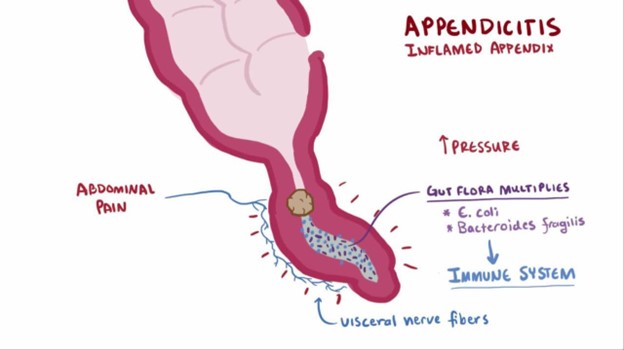A nurse is caring for a 6-month-old infant who has a prescription for clear liquids by mouth after a repair of an intussusception. Which of the following fluids should the nurse select for the infant?
Half-strength orange juice
Sterile water
Half-strength infant formula
Oral electrolyte solution
The Correct Answer is D
For a 6-month-old infant who has undergone the repair of an intussusception, the nurse should select an oral electrolyte solution. This solution is specifically designed to replace lost fluids and electrolytes due to vomiting or diarrhea, which is crucial in preventing dehydration in infants.
Options A, B, and C are not suitable choices for an infant in this situation:
A. Half-strength orange juice: Citrus juices, including orange juice, are not recommended for infants under 12 months old. They are acidic and may cause stomach upset or diarrhea.
B. Sterile water: Sterile water does not contain the necessary electrolytes, and offering plain water to an infant after surgery or during an illness can lead to electrolyte imbalances and further dehydration.
C. Half-strength infant formula: Diluting infant formula can lead to inadequate nutrition for the infant. The baby requires appropriate nutrition to support recovery after surgery, and diluting formula can be harmful.
D. An oral electrolyte solution is the best choice as it helps maintain proper hydration and electrolyte balance in the infant's body during the recovery period. If the infant tolerates the oral electrolyte solution well and is not at risk for aspiration, the healthcare provider may gradually advance the diet to include other clear liquids and then slowly reintroduce regular infant formula or breast milk as appropriate. The healthcare provider's instructions should be followed carefully to support the infant's recovery and ensure adequate nutrition.
Nursing Test Bank
Naxlex Comprehensive Predictor Exams
Related Questions
Correct Answer is A
Explanation
A. Apex of the heart:The apex of the heart is the preferred site for measuring an infant's heart rate. It is located at the 4th or 5th intercostal space, just medial to the midclavicular line, allowing for accurate auscultation of the heartbeat.
B. Carotid artery:While the carotid artery can be used to assess heart rate in older children and adults, it is not ideal for infants due to the risk of compromising circulation to the brain if pressure is applied too forcefully.
C. Brachial artery:The brachial artery is often used to assess pulse in infants, especially in cases of CPR, but it is not the preferred site for routine heart rate measurement. It may be used when assessing circulation or checking for pulses, but auscultation at the apex is more accurate for heart rate.
D. Radial artery:The radial artery can be difficult to palpate in infants due to their small size and is generally not used for heart rate assessment in this age group. The apex is a more reliable location.
Correct Answer is B
Explanation
The nurse should clarify the prescription to administer sodium biphosphate/sodium phosphate because it is a laxative and is contraindicated in a child with suspected appendicitis. The use of laxatives or enemas can potentially worsen the condition by increasing the risk of perforation or rupture of the inflamed appendix.
A. Monitoring oral temperature every 4 hours is important to assess for signs of infection or worsening condition.
C. Maintaining NPO status is essential to avoid stimulating the digestive system and to prepare for possible surgery.
D. Medicating the client for pain every 4 hours as needed is appropriate to manage pain and provide comfort while the child awaits further evaluation or treatment.
Remember, it's crucial to avoid the use of laxatives, enemas, or any other interventions that can potentially aggravate the inflamed appendix in a child with suspected appendicitis.

Whether you are a student looking to ace your exams or a practicing nurse seeking to enhance your expertise , our nursing education contents will empower you with the confidence and competence to make a difference in the lives of patients and become a respected leader in the healthcare field.
Visit Naxlex, invest in your future and unlock endless possibilities with our unparalleled nursing education contents today
Report Wrong Answer on the Current Question
Do you disagree with the answer? If yes, what is your expected answer? Explain.
Kindly be descriptive with the issue you are facing.
